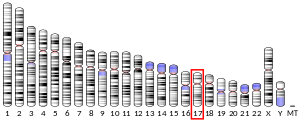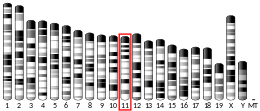BCAS3
Breast carcinoma amplified sequence 3, also known as BCAS3, is a protein which in humans is encoded by the BCAS3 gene.[5][6] BCAS3 is a gene that is amplified and overexpressed in breast cancer cells.[6]
Function
The BCAS3 gene is regulated by estrogen receptor alpha (ER-α).[7] The PELP1 protein acts as a transcriptional coactivator of estrogen receptor induced BCAS3 gene expression. In addition BCAS3 possesses histone acetyltransferase activity and itself appears to act as a coactivator of ER-α.[8] Furthermore, BCAS3 requires PELP1 to function as a coactivator in ER-α. Hence BCAS3 apparently is involved in a positive feedback loop leading to ER-α mediated signal amplification.[8]
gollark: ```javascriptexport const enqueueCrawl = async (crawlURL, tier) => { // robotsPolicy will be filled in on first actual crawl for the domain // this has to be done as a fairly complex DB-side query to prevent race conditions console.log("running insert for", crawlURL.toString()) const [domain] = await DB`INSERT INTO domains (domain, enabled, robotsPolicy, tier) SELECT ${crawlURL.hostname}, FALSE, NULL, ${tier} WHERE NOT EXISTS (SELECT id, domain, enabled, robotsPolicy, tier FROM domains WHERE domain = ${crawlURL.hostname}) RETURNING id` console.log(crawlURL.toString(), domain) // Add entry to crawl queue await DB`INSERT INTO crawl_targets (url, domain) VALUES (${crawlURL.toString()}, ${domain.id}) ON CONFLICT (url) DO UPDATE SET added = NOW()`}```This should NOT be quite so bee.
gollark: I'm busy trying to work out exactly how horrible a PostgreSQL query I need to do this stupid thing under concurrent write load.
gollark: So surely YOU can do it, if ""deforming things"""" is so easy.
gollark: I can't really do art, in general.
gollark: I appear to be encountering a race condition in my code. This is very troubling.
References
- GRCh38: Ensembl release 89: ENSG00000141376 - Ensembl, May 2017
- GRCm38: Ensembl release 89: ENSMUSG00000059439 - Ensembl, May 2017
- "Human PubMed Reference:". National Center for Biotechnology Information, U.S. National Library of Medicine.
- "Mouse PubMed Reference:". National Center for Biotechnology Information, U.S. National Library of Medicine.
- "Entrez Gene: BCAS3 breast carcinoma amplified sequence 3".
- Bärlund M, Monni O, Weaver JD, Kauraniemi P, Sauter G, Heiskanen M, Kallioniemi OP, Kallioniemi A (December 2002). "Cloning of BCAS3 (17q23) and BCAS4 (20q13) genes that undergo amplification, overexpression, and fusion in breast cancer". Genes Chromosomes Cancer. 35 (4): 311–7. doi:10.1002/gcc.10121. PMID 12378525.
- Gururaj AE, Singh RR, Rayala SK, Holm C, den Hollander P, Zhang H, Balasenthil S, Talukder AH, Landberg G, Kumar R (April 2006). "MTA1, a transcriptional activator of breast cancer amplified sequence 3". Proc. Natl. Acad. Sci. U.S.A. 103 (17): 6670–5. doi:10.1073/pnas.0601989103. PMC 1458939. PMID 16617102.
- Gururaj AE, Peng S, Vadlamudi RK, Kumar R (August 2007). "Estrogen induces expression of BCAS3, a novel estrogen receptor-alpha coactivator, through proline-, glutamic acid-, and leucine-rich protein-1 (PELP1)". Mol. Endocrinol. 21 (8): 1847–60. doi:10.1210/me.2006-0514. PMID 17505058.
External links
- Human BCAS3 genome location and BCAS3 gene details page in the UCSC Genome Browser.
Further reading
- Maruyama K, Sugano S (1994). "Oligo-capping: a simple method to replace the cap structure of eukaryotic mRNAs with oligoribonucleotides". Gene. 138 (1–2): 171–4. doi:10.1016/0378-1119(94)90802-8. PMID 8125298.
- Suzuki Y, Yoshitomo-Nakagawa K, Maruyama K, et al. (1997). "Construction and characterization of a full length-enriched and a 5'-end-enriched cDNA library". Gene. 200 (1–2): 149–56. doi:10.1016/S0378-1119(97)00411-3. PMID 9373149.
- Bärlund M, Monni O, Weaver JD, et al. (2003). "Cloning of BCAS3 (17q23) and BCAS4 (20q13) genes that undergo amplification, overexpression, and fusion in breast cancer". Genes Chromosomes Cancer. 35 (4): 311–7. doi:10.1002/gcc.10121. PMID 12378525.
- Strausberg RL, Feingold EA, Grouse LH, et al. (2003). "Generation and initial analysis of more than 15,000 full-length human and mouse cDNA sequences". Proc. Natl. Acad. Sci. U.S.A. 99 (26): 16899–903. doi:10.1073/pnas.242603899. PMC 139241. PMID 12477932.
- Ota T, Suzuki Y, Nishikawa T, et al. (2004). "Complete sequencing and characterization of 21,243 full-length human cDNAs". Nat. Genet. 36 (1): 40–5. doi:10.1038/ng1285. PMID 14702039.
- Gerhard DS, Wagner L, Feingold EA, et al. (2004). "The status, quality, and expansion of the NIH full-length cDNA project: the Mammalian Gene Collection (MGC)". Genome Res. 14 (10B): 2121–7. doi:10.1101/gr.2596504. PMC 528928. PMID 15489334.
- Kimura K, Wakamatsu A, Suzuki Y, et al. (2006). "Diversification of transcriptional modulation: large-scale identification and characterization of putative alternative promoters of human genes". Genome Res. 16 (1): 55–65. doi:10.1101/gr.4039406. PMC 1356129. PMID 16344560.
- Gururaj AE, Singh RR, Rayala SK, et al. (2006). "MTA1, a transcriptional activator of breast cancer amplified sequence 3". Proc. Natl. Acad. Sci. U.S.A. 103 (17): 6670–5. doi:10.1073/pnas.0601989103. PMC 1458939. PMID 16617102.
- Gururaj AE, Holm C, Landberg G, Kumar R (2006). "Breast cancer-amplified sequence 3, a target of metastasis-associated protein 1, contributes to tamoxifen resistance in premenopausal patients with breast cancer". Cell Cycle. 5 (13): 1407–10. doi:10.4161/cc.5.13.2924. PMID 16855396.
- Gururaj AE, Peng S, Vadlamudi RK, Kumar R (2007). "Estrogen induces expression of BCAS3, a novel estrogen receptor-alpha coactivator, through proline-, glutamic acid-, and leucine-rich protein-1 (PELP1)". Mol. Endocrinol. 21 (8): 1847–60. doi:10.1210/me.2006-0514. PMID 17505058.
This article is issued from Wikipedia. The text is licensed under Creative Commons - Attribution - Sharealike. Additional terms may apply for the media files.




